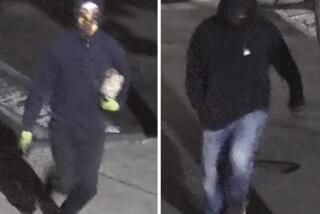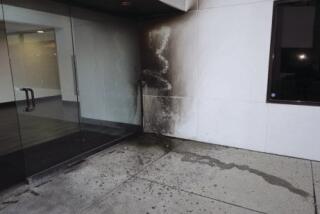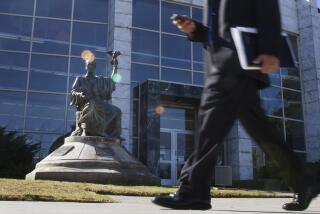Convict Pressed on ’85 Slaying
- Share via
Federal prosecutors are pressuring convicted Jewish Defense League activist Earl Krugel to reveal what he might know about the unsolved slaying of Arab American civil rights leader Alex Odeh, according to court records and sources familiar with the case.
The U.S. attorney’s office has asked a federal judge to rule that Krugel has violated the terms of his plea agreement, making him subject to the maximum punishment allowed, court documents reveal.
Krugel, a former JDL organizer, is awaiting sentencing after pleading guilty nearly a year ago to conspiring to bomb the King Fahd Mosque in Culver City and a field office of U.S. Rep. Darrell Issa (R-Vista), who is an Arab American.
In keeping with his plea deal, Krugel has undergone hours of interrogation by federal agents. Sources close to the case said this week that the FBI has concluded that Krugel is withholding information he may have on the Odeh murder.
Odeh, western regional director of the American Arab Anti-Discrimination Committee, was killed by a bomb that was triggered when he opened the front door of his Santa Ana office in 1985. The Justice Department has offered a $1-million reward for information leading to the arrest and conviction of whoever was responsible.
Over the years the FBI has investigated several onetime JDL members in connection with the slaying but no charges have ever been brought. The JDL has denied any involvement
Krugel, 61, a dental assistant from Reseda, is facing a 10- to 20-year prison sentence under terms of his plea agreement in the bombing conspiracy case. His lawyers had expressed the hope he would receive a prison term of no more than 13 years. Prosecutors have recommended a 15- to 16-year sentence.
If Krugel is found to have breached the plea agreement, the prosecution would be free to reinstate the original charges, exposing him to a possible 45-year sentence.
Assistant U.S. Atty. Gregory Jessner, who is prosecuting the case, declined to comment on the government’s motion. But defense co-counsel Peter Morris said his client “has met all of his obligations to the government under the plea agreement.” He accused the prosecution of “overreaching.”
The government motion and a defense response were filed under seal in October. A brief description of both documents, however, is included in the public file in the federal court clerk’s office. U.S. District Judge Ronald S.W. Lew has yet to rule on the issue. Krugel’s sentencing and a hearing on the plea agreement dispute are scheduled for March 29.
Since the prosecution moved against him last fall, Krugel has replaced his defense lawyer, Mark Werksman, with Morris and attorney Bryan Altman. The latter pair previously represented Krugel’s co-defendant in the bombing case, JDL national Chairman Irv Rubin, who committed suicide by jumping from a balcony at the federal Metropolitan Detention Center in downtown Los Angeles.
Krugel has been denounced by his former JDL associates for having implicated Rubin in the bombing plot. In a written statement read into the court record at the time of his plea on Feb. 4, 2003, Krugel said he and Rubin had enlisted a younger JDL member to carry out the bombings. Rubin chose the targets and Krugel supervised the purchase of metal pipes and explosive powder to be used in the bombs, the statement said.
The JDL member recruited to plant the bombs, Danny Gillis, contacted the FBI, however, and wore a concealed recording device during a series of meetings with Krugel and Rubin.
According to a transcript of one planning session, Krugel said the JDL needed to “send a wake-up call” to Arabs by doing something to one of their “filthy mosques.” Gillis told the FBI that Krugel instructed him to scout about a dozen potential targets in Los Angeles and Orange counties.
Krugel and Rubin were arrested Dec. 11, 2001, just days before the mosque was to be bombed.
More to Read
Sign up for Essential California
The most important California stories and recommendations in your inbox every morning.
You may occasionally receive promotional content from the Los Angeles Times.













